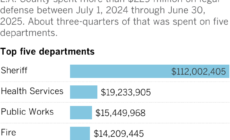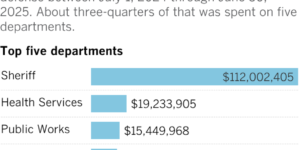-
This is How Hard It Will Be to Get Around Italy’s Winter Olympics - 16 mins ago
-
Chaos in Minneapolis Exposes an Internet at War With Truth - about 1 hour ago
-
California colleges scramble to fill gaps left by federal grant cuts to Latino students - about 1 hour ago
-
Disney Names Josh D’Amaro as Next C.E.O. - 2 hours ago
-
Defending Sheriff’s Department cost L.A. County over $100 million - 2 hours ago
-
Online Sleuths Think Justin Bieber’s Tattoo for Hailey Points to Ex Selena - 2 hours ago
-
‘They Couldn’t Break Me’: A Protester, the White House and a Doctored Photo - 2 hours ago
-
Amtrak Urges World Cup Fans To Book Early - 3 hours ago
-
Big people, small seats and Southwest’s open seating roulette - 3 hours ago
-
Palestinians Return to Gaza for First Time in Nearly Two Years - 3 hours ago
Federal defense lawyers ‘face financial ruin’ after months without pay, memo says

California defense attorneys facing the threat of eviction. Some paying for case-related expenses out of pocket. Others forced to stop taking federal court appointed cases to ensure financial survival.
Defense attorneys laid out the dire circumstances in a Tuesday memo to the U.S. District Court for the Central District of California, noting that court-appointed private attorneys who represent indigent federal criminal defendants have been working without pay since funds ran out in July.
They urged the court to reject a memo federal prosecutors sent to the court last month, which said judges could compel attorneys to represent defendants without compensation amid concerns that defendants would not have counsel for initial appearances and detention hearings.
Lawyers on what’s known as the Criminal Justice Act panel — who step in when federal public defenders have conflicts — are paid from funds appropriated by Congress to the Judicial Branch’s Defender Services program. The program ran out of money on July 3 and the government shutdown has only drawn out the unprecedented funding lapse playing out across the country.
As a result of the lack of funding, defense attorneys have filed motions to dismiss cases and — in some cases around the country — judges have stayed criminal proceedings. In New Mexico, lawyers stopped accepting new court-appointed defense work because of the funding crisis.
“Attorneys have long been appointed to serve without compensation, and doing so presents no constitutional problem,” prosecutors wrote in their Oct. 27 memo, which also referenced the possibility of imprisonment for contempt in cases of refusal to serve.
Ciaran McEvoy, a spokesperson for the U.S. attorney’s office in Los Angeles, said they submitted the memo “at the direction of the court.”
In their own memo, defense attorneys argued that compensating defense attorneys “is critical to ensuring effective representation.”
Many “criminal practitioners in this district already face financial ruin from the existing prolonged nonpayment,” defense attorneys said. “Contrary to the government’s claims, this Court may not simply force unwilling attorneys to represent criminal defendants without pay.”
“The months-long cessation of payments to CJA attorneys … has already taken a devastating toll on these attorneys’ ability to survive financially, attend to their families’ basic needs, and effectively represent their clients against the extraordinary weight of the United States government.”
The defense attorneys called the government’s suggestion that panel attorneys accept more unpaid appointments “deeply insulting to the extraordinary sacrifices they have already made.”
Amid the funding crisis, the number of panel attorneys available to take cases has been reduced from around 85 to around 20, according to Anthony M. Solis, a defense attorney who is also a Los Angeles CJA panel representative. Solis said they don’t believe that appointing attorneys without compensation would be “legal, ethical or even tenable or desirable.”
According to Solis, panel attorneys and service providers nationwide are owed around $150 million, with fears that those outstanding debts could result in another funding crisis next year, even if the government shutdown were to end this week.
“What we really need is for Congress to pass what they call an anomaly to fund the deficit from the previous budget so then we can start the next year’s budget, that starts October 1, all afresh,” Solis said. “Because if we don’t do that, then we’re going to wind up exhausting next year’s budget with last year’s obligations that we’re still owed.”
According to the Administrative Office for the U.S. Courts, more than 90% of defendants in federal criminal cases have court-appointed counsel. Nationwide, federal defenders’ organizations handle about 60% of publicly financed cases; the remaining 40% percent are assigned to private, qualified defense lawyers who agree to serve on the CJA panel.
Around the country, more than 12,000 private panel attorneys accept CJA assignments annually. According to the Administrative Office for the U.S. Courts, of those, about 85% “work for small firms or are solo practitioners who can ill afford long delays in payments for their work.”
Marilyn Bednarski, an L.A. CJA panel representative, said it’s not easy to recruit panel members for multiple reasons, including the lengthy vetting process and the hourly rate of $175 an hour which she said “has not kept pace with the economy.”
Due to the current funding crisis, Bednarski said “a lot of people who are on the panel have simply said I cannot take a case, I can’t do it because I have to divert my resources to my retained cases to keep my lights on.”
“Not only has it gone on for months, and now there’s this backlog, even once payments start, this idea that we’re going to run out earlier next year is having an impact on the morale of the panel as well as the ability to recruit people,” she said.
The memo this week included a transcript from an October hearing in federal court, in which Ian Wallach, who has been a panel attorney since 2018, said that by December he’d be “flat out of money.”
“We’re talking out of money to pay rent, to pay car payments, to pay health insurance, and to pay life insurance,” Wallach said, according to the transcript.
Wallach told the judge he’d gone to CJA’s counsel and received a letter from the court explaining the situation and the delayed payment.
“I took that to the management company where I live and was told that if I don’t pay, I get a three-day notice,” Wallach said.
Wallach, a criminal defense and civil rights attorney, told the Times that the court appointed cases make up around 50% of his practice. He has a civil rights practice, where he makes the bulk of his money, but said “payments are intermittent on those.”
He said he’s now on two MS-13 trials, one of which he was appointed to last minute in August. He made a motion to withdraw as counsel from the more recent case, but said the judge denied it.
“It’s a hard pill to swallow to keep working and working and working and incurring this debt,” he said. At this point, Wallach said he’s owed around $100,000.
Another panel attorney mentioned in the memo said they have two small children “and my expenses have exceeded our income three months in a row because I dedicated time to my federal [CJA-appointed] case.”
“I’m facing special needs and possible private school [for the children] with no ability to pay,” the attorney said.
Solis said the lack of funding has also affected the ability to retain service providers, like interpreters, paralegals and investigators. Some service providers, he said, have had to transition to driving for rideshare companies because of their “financial distress.”
“Service providers are the people who have a far smaller income, who could less afford to weather fluctuations in their income than maybe attorneys can,” Solis said.
Source link











